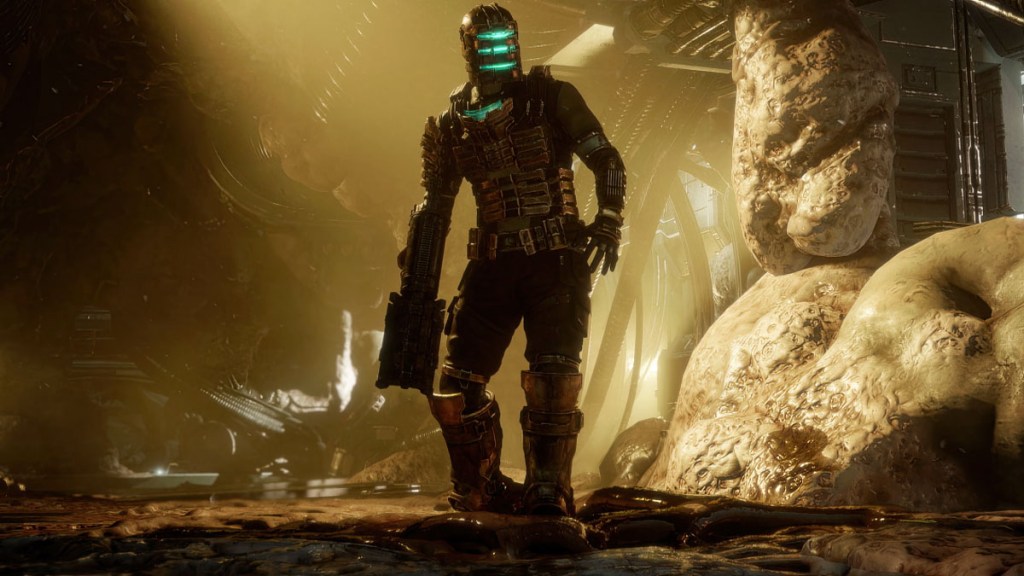After being burned by Resident Evil 3, I’m wary of any survival horror remake. So, I initially didn’t have high hopes for the Dead Space remake when it was announced. However, as EA Motive revealed more, I found my optimism rising. The studio stated multiple times that its prime directive was to be respectful of the source material, and it turned out better than I had hoped.
Note this review is aimed at readers who have played the original Dead Space. For a review from someone who didn’t experience the original beforehand, check out our sister site, GameRevolution.
Warning: There are minor spoilers for the game below.
Mr. Clarke finds his voice
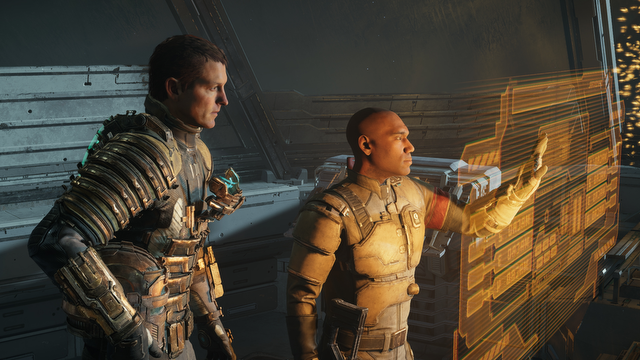
The story beats in the Dead Space remake remain the same. You take the role of Issac Clarke, an engineer tasked with accompanying an emergency maintenance team to the USG Ishimura. Unfortunately, the ship carrying the team crashes into the Ishimura, and they find themselves stranded there. The Necromorphs quickly make their presence known, and Clarke finds himself fighting to make it off the Ishimura alive.
The biggest difference to the plot this time around is that Issac is a fully-voiced character instead of a silent protagonist. Since this was the case in Dead Space 2 and 3, it makes sense that the devs would want to revisit the script and give Issac more agency.
In practice, Issac’s new characterization is a mixed bag. Giving him a voice removes some of Dead Space’s claustrophobia. In the original, you weren’t just trapped in the narrow corridors of the Ishimura. You were ensnared by a gallery of nefarious characters that were using you to their own ends. You were forced to go along with whatever you were told in the vague hope that it would somehow lead to an escape.
In the remake, Issac is treated as an equal partner by Hammond and Daniels. It shifts the tone of his relationship with these two tremendously when Issac offers input and gives his opinion. Also, for some reason, Hammonds and Daniels are less antagonistic toward each other in the remake, which takes away that awkward feeling of being stuck in the middle that the original gave.
Fortunately, EA Motive did avoid making Issac too chatty in the Dead Space remake. He doesn’t typically speak until spoken to and keeps things relatively brief. He also doesn’t constantly talk to himself and make quips, which is great most of the time.
However, some awkward moments occur when Issac remains completely mum when it’s inappropriate. For example, in the medical section, you enter a room and see a woman in an isolation tube kill a patient by slicing him wide open from stem to sternum, and then she casually slits her own throat. This definitely seems like the kind of scene where you might throw out, “No stop,” or at least a “Dang.” Instead, Issac is utterly silent concerning the poor woman’s fate.
Making the dead come to life
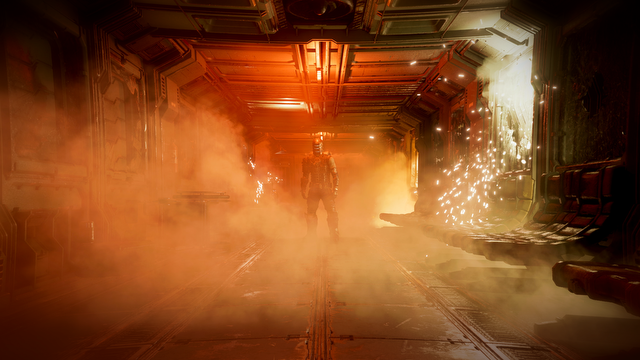
The graphical upgrades in Dead Space remake are excellent. Many environments replicate what we saw in the original, which looks terrific. However, the big star here is the new effects. The new, vastly improved smoke, fog, fire, and sparks all combine to make the Ishimura feel more lifelike than ever before.
Fortunately, Motive didn’t overdo things here. While some areas feel a bit more homogenous than they did before, each has a unique feel that lets you imagine what it might have been like before the Necromorphs. Engineering has massive engines and fuel tanks, medical is full of labs and macabre scenes, and there are plenty of doodads making noise and moving in the background to paint an even better picture that you’re on a massive starship.
This time around, you can traverse from one end of the Ishimura to the other without a loading screen or even using the tram system. The devs hyped this up a major deal, but the progression in the Dead Space remake is almost exactly the same as it was in the original.
There are a few side quests that expand the story of select NPCs. However, these are just short little jaunts, and some can be done on the way to your main quest objectives. Unfortunately, one of these robs Nicole of some of her mystique. In the original, you’re left to fill in a lot of the blanks about what she was doing before Issac boarded the Ishimura with your imagination. However, the remake makes her out to be a bit of a martyr, which makes her less interesting as a character.
Don’t dead, open inside
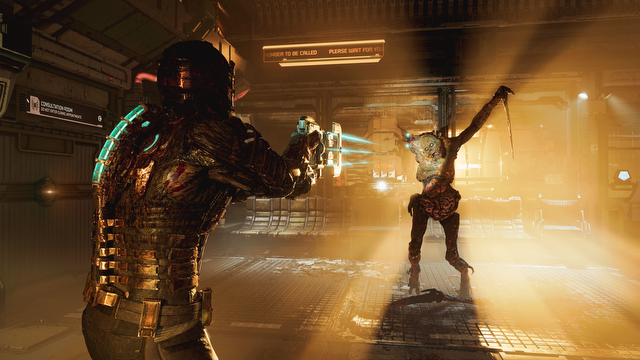
In the original game, once you cleared a section, that was it. All encounters were scripted, so once it was over, you knew that part of the ship was safe. However, that doesn’t really vibe when your foes can spring out of airducts or generate new Necromorphs out of corpses. Fortunately, Motive came up with a solution for this. According to the devs, the Intensity Director AI has around 1,200 scenarios it can throw at you anytime.
You never know what will happen when you enter an area in the remake. You may hear gunshots in the distance and screaming as the remaining crew members of the Ishimura fight for their lives. Enemies might burst from air ducts, or you may just hear them rattling around. Power could fail in your section and leave you shrouded in darkness. It’s a great way to keep you on your toes and addresses an issue that has plagued horror games since their inception. The director works alongside pre-scripted encounters, so each playthrough should be different.
Of course, sound plays a big part in the original Dead Space’s presentation, which carries over into the remake. Motive kept the original score by Jason Graves and added new audio cues to work alongside the AI Intensity Director.
The work by Graves still feels fresh, but, unfortunately, the new musical cues often feel overwhelming. Too often, a blaring of strings gave away the surprise of an enemy encounter before I could hear or see them. I hope they’re toned down in a future patch because it detracts from the otherwise excellent sound design.
Making the right changes
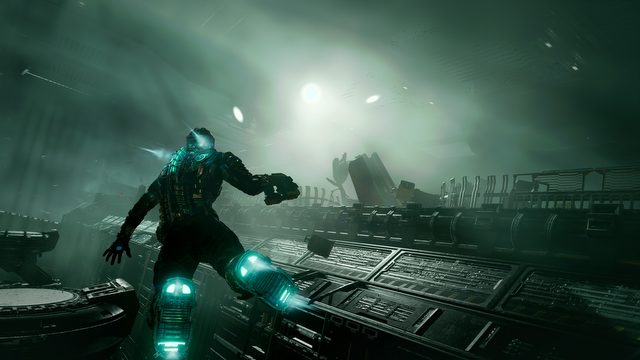
The gameplay in Dead Space is amazingly fresh for a 15-year-old game, but some parts have aged better than others. The remake takes the opportunity to add some quality-of-life features and changes some of the more annoying sections for the better.
Zero-G gameplay, which limited Issac to jumping in one direction from surface to surface, now has six degrees of freedom in its movement. This allowed Motive to completely revamp sections like activating the ADS cannons and fighting Leviathan.
One thing I didn’t notice during my playthrough was any missing content. Like with the Resident Evil 2 remake, there are some differences in text and audio logs and some new and tweaked lore (particularly when it comes to Unitology), but everything from the original is represented. Unlike Resident Evil 3 remake, there are no missing locations or vastly different interpretations of the source material.
Dead Space Remake review: The final verdict
The Dead Space remake is the definitive version of the game. The original has aged relatively well, but it’s not available on current-gen consoles, and the PC version is finicky on newer hardware and versions of Windows. Some changes in the remake work better than others, but the important thing is that, like the original, it’s survival horror at its best and a worthy successor to the beloved series.
-
Updated graphics and new effects look great.
-
Includes everything from the original.
-
New content fits in well.
-
Zero-G gameplay improvements.
-
Intensity Director makes return trips to areas much more intense.
-
Issac being voiced doesn't always work well.
-
Some changes and additions aren't for the better.
